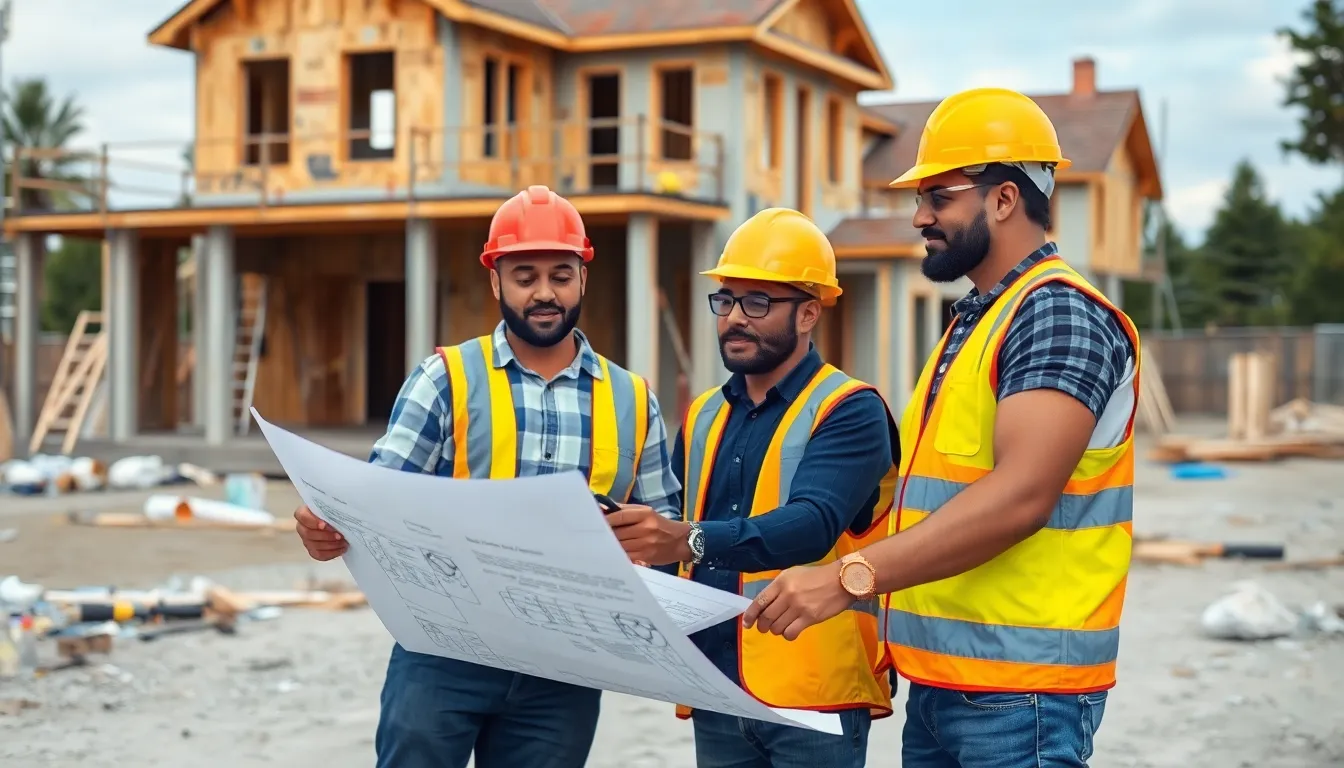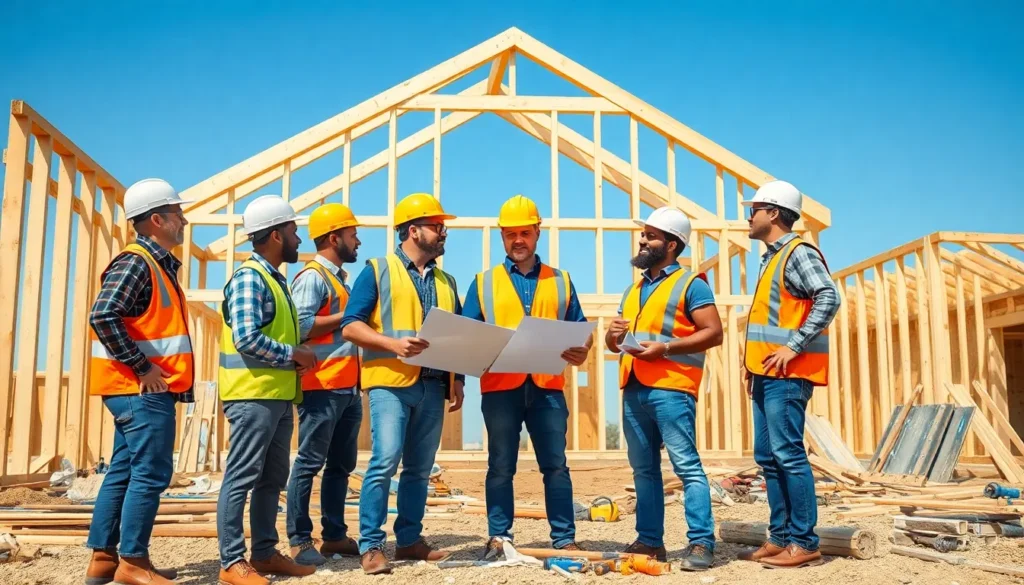Building homes is a dream for many, but let’s face it—dreams can sometimes turn into nightmares. One minute you’re laying the foundation, and the next, a rogue raccoon decides to make your site its new playground. That’s where home builders insurance comes in, like a superhero in a hard hat, ready to save the day.
This essential coverage protects builders from the unexpected twists and turns of construction life. From accidents to property damage, it’s the safety net every builder needs. So, before diving headfirst into that next big project, consider this your friendly reminder: don’t let your dreams crumble like a poorly mixed batch of concrete. Let’s explore how home builders insurance can keep your construction aspirations on solid ground.
Home Builders Insurance
Home builders insurance protects builders against unforeseen occurrences during construction projects. Coverage typically includes property damage, liability for accidents, and other risks associated with the building process. It addresses concerns such as injuries to workers, damages to materials on site, and issues arising from construction defects.
Builders can select various policy types tailored to their needs, including general liability, workers’ compensation, and builder’s risk insurance. General liability insurance covers third-party claims for injury or damage, while workers’ compensation offers support for employee injuries. Builder’s risk insurance specifically protects homes under construction from damages caused by events like fire or theft.
Understanding the specific risks associated with home building allows builders to make informed insurance decisions. Appropriate coverage not only safeguards financial investments but also promotes peace of mind throughout the construction process. A sound insurance policy acts as a vital safety net for builders, ensuring they can navigate challenges effectively.
Selecting the right insurance involves evaluating project scale, duration, and location. Builders should consult insurance professionals to determine their unique needs and choose policies that provide comprehensive protection. Each project may require different coverage levels, depending on its scope and complexity.
Focusing on home builders insurance enhances builders’ ability to manage risks proactively. With proper coverage, uncertainty diminishes, allowing builders to concentrate on delivering quality homes. It facilitates smoother operations by insulating builders from potential financial hardships resulting from unexpected incidents.
Types of Home Builders Insurance

General Liability Insurance
General liability insurance covers third-party bodily injury and property damage claims. This insurance protects builders from lawsuits arising from accidents on-site or resulting from completed work. In addition, it often covers medical expenses for injuries on the job site and legal defense costs. Many builders consider this a fundamental policy, as it safeguards against potentially devastating financial consequences.
Builders Risk Insurance
Builders risk insurance protects against direct physical loss or damage to homes under construction. Coverage typically includes risks like fire, theft, and vandalism during the building process. This insurance starts when construction begins and ends once the project is completed or occupied. Builders find this coverage critical, especially for major projects, as it addresses unique risks arising from construction activities.
Benefits of Home Builders Insurance
Home builders insurance offers essential protection against a variety of risks associated with construction projects. Coverage for property damage helps mitigate financial losses due to unforeseen events like fires or severe weather. Liability coverage protects builders from legal claims stemming from accidents that occur on-site, ensuring that they’re safeguarded against expensive lawsuits.
Workers’ compensation forms another critical component of home builders insurance. This coverage supports builders by covering medical expenses and lost wages for employees injured during the construction process. By having this protection, builders foster a safer work environment and protect their financial investments.
Builder’s risk insurance specifically addresses the hazards faced during construction. This policy covers damages to homes being built, ensuring that losses due to theft or vandalism do not adversely affect project budgets. Builders benefit from this security as it allows them to focus on quality and craftsmanship without the constant worry of potential financial setbacks.
Customizing insurance plans aligns coverage with the unique needs of each project. Home builders can select policies based on factors like project scale and location, tailoring their insurance to efficiently meet specific requirements. Consulting with insurance experts ensures that builders make informed decisions that serve their interests best.
Access to comprehensive insurance leads to enhanced credibility in the eyes of clients. When builders possess adequate insurance coverage, it increases consumer confidence, as clients feel more secure choosing insured professionals for their projects. This trust often translates into more business opportunities and a stronger professional reputation.
How to Choose the Right Home Builders Insurance
Selecting the appropriate home builders insurance involves careful consideration of various factors. This choice directly impacts both builders’ financial security and project success.
Assessing Your Needs
He or she should start by identifying specific risks associated with the construction project. Evaluating project scale, duration, and location aids in determining necessary coverage types. Builders must consider unique challenges like local weather conditions or specific building codes. Gathering information about past projects can also reveal potential liability and loss risks. Knowing the workforce size and structure helps clarify workers’ compensation needs. This assessment provides a solid foundation for informed insurance selections.
Comparing Providers
Comparing insurance providers fosters confidence in choosing the right policy. Begin by researching multiple companies and their reputations within the construction industry. Reviewing customer testimonials and claims-handling processes reveals insight into provider reliability. Policies should include coverage specifics like general liability, builders risk, and workers’ compensation. Obtaining quotes from several insurers allows for direct coverage and price comparisons. Professional guidance from an insurance agent may streamline this process and ensure comprehensive understanding. Prioritize insurers who specialize in home builders insurance and have a proven track record.
Common Exclusions in Home Builders Insurance
Home builders insurance offers vital protection, yet certain exclusions can remain unaddressed. Perils such as earthquakes and floods typically aren’t covered under standard policies. Water damage resulting from flooding often requires separate coverage. Builders often overlook equipment breakdown, which also isn’t included in most plans, leading to potential financial setbacks.
Improper workmanship claims do not receive coverage either. If defects arise from builder negligence, insurance might not cover the costs. Additional exclusions include contractor error and negligence, which can create liability issues without adequate protection.
Another common exclusion involves existing damage. Since home builders insurance prioritizes new construction, it usually excludes claims associated with pre-existing structures. Personal property on the construction site might not be fully covered, especially without an additional rider.
Subcontractors’ actions also present a challenge. If a subcontractor causes damage or injury, liability might fall outside the builder’s insurance coverage. Theft of building materials often requires specific endorsements, as standard policies may not extend to lost materials.
Failure to comply with building codes or local regulations typically leads to exclusions. Insurance providers often deny claims when builders don’t adhere to necessary regulations during construction.
By understanding these common exclusions, builders can better navigate their insurance policies. Each exclusion requires careful consideration, prompting builders to consult with insurance professionals for comprehensive coverage. Customizing plans to address these gaps becomes essential, ensuring builders remain protected against unexpected incidents.

